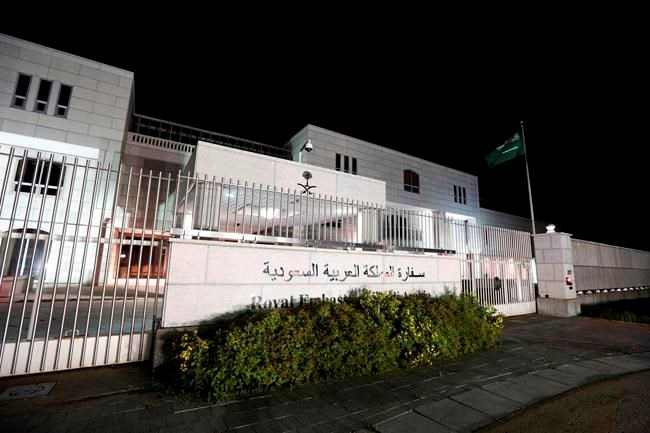A couple of hundred students from Saudi Arabia who are studying on Vancouver Island are being told to leave as soon as possible even though they haven’t finished their programs.
An estimated 15,000 Saudi students across Canada are affected. Most of them appear to be in Canada on scholarships at post-secondary schools. Canadian officials say they haven’t received much information about the departures, but have heard that students have been given four weeks to leave.
Saudi Arabia imposed sanctions on Canada on the weekend, citing a Global Affairs Department message on Twitter that criticized the Saudi government for arresting two female bloggers and activists. The Middle East nation is withdrawing students, rejecting new business ventures and suspending flights.
Foreign Affairs Minister Chrystia Freeland said on Monday that Canadians expect their government’s foreign policy to be guided by their values. “We are always going to speak up for human rights, we are always going to speak up for women’s rights and that is not going to change,” Freeland said in Vancouver.
On the Island, Saudi Arabian students are mostly attending schools in Greater Victoria and Nanaimo.
Vancouver Island University in Nanaimo has 93 students from Saudi Arabia enrolled and of those, 80 are sponsored by their government, said Graham Pike, dean of international education.
More than 60 are in the bachelor degree program studying business administration. Others are in a variety of other programs and some are taking English-language upgrading, he said.
The university is hoping to set up a meeting with the students today to hear what their concerns and issues are, he said. “We are as concerned for them as anything else.”
A few students from Saudi Arabia live on campus with the rest living in the community, Pike said.
At Camosun College, 34 Saudi students are funded through Saudi Arabia’s King Abdullah scholarship program, said Geoff Wilmshurst, vice-president of partnerships. Students from Saudi Arabia have been attending Camosun for the past five to six years, reaching a peak of 75 at one point.
They typically attend Camosun for four years to earn a bachelor’s degree in business, he said.
Camosun has a small team of people reaching out to the students who are here, he said.
As well, Camosun is prepared to work with other post-secondary schools outside of Canada to help the Saudi students transfer there to finish their school work, if the situation requires it, he said. Camosun has relationships and participates in exchange programs with universities elsewhere.
The University of Victoria saw 51 Saudi Arabian students (26 undergraduate and 25 graduate) enroll in summer courses this year. A total of 34 (23 undergraduate and 11 graduate) are enrolled in September.
Jim Dunsdon, UVic associate vice-president student affairs, said: “We value all of our international students and are disappointed to learn that students from Saudi Arabia may not be able to achieve their educational aspirations at UVic. They bring a unique perspective and diversity to our community and enrich our campus population in many ways.
“However, it is really too early to tell what the implications are for the university and our Saudi Arabian students.”
Royal Roads University and Lester B. Pearson United World College of the Pacific each said they do not have any Saudi students.
Inlingua Victoria Language School has two or three students from Saudi Arabia attending on scholarships paid for by their government, said Craig Kelley, director of operations.
“Most of the 15,000 that you are hearing [about] in reports, they are all university students. They are mostly at the bigger universities. If you talk to the top universities in Canada, that is where they are going to school.”
He has received nothing official from the government of Saudi Arabia in relation to the school’s students.
Students attend Inlingua for six months to a year. “They are here to improve their language skills so that they can get into a university,” Kelley said.
Paula Jamieson, chief operations officer at Global Village English Centres, said they have fewer than 20 Saudi Arabian students. “But it is still an important part of our school’s fabric because we work so hard at bringing together multiple linguistic backgrounds in one English classroom.”
The school will probably follow any direction from Languages Canada, which represents schools teaching English and French in Canada, she said.



